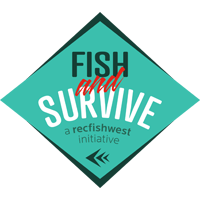Fishing For Beginners
New to fishing? Make sure you come home safely
Fishing is WA's most loved recreation as it offers opportunities for all levels of fishers. If you're new to fishing and want to learn more about being safe whilst catching fish, please see the checklist below and browse this website.
Know the conditions
- Step 1: CHECK when high tide is – A rising tide can increase wave energy which in turn may produce bigger waves than average.
- Step 2: CHECK for large waves – Large seas or swell waves can be hazardous.
- Step 3: CHECK for strong winds – Strong winds can create hazardous waves.

For more weather information visit bom.gov.au
If you're planning on travelling to a national park for your fishing experience and you are unfamiliar with the location, please visit your local Government website:
parks.dpaw.wa.gov.au
nationalparks.nsw.gov.au
depi.vic.gov.au/environment-and-wildlife
nprsr.qld.gov.au
parks.tas.gov.au
environment.sa.gov.au/parks/Home
parksandwildlife.nt.gov.au
Clothing
For warm weather:
Because of the harmful effects of the sun and its ability to cause skin cancer, it is a good idea to wear a high SPF sunscreen as well as a hat and protective clothing with long sleeves and light colours to reflect sunlight. Because UV rays from sunlight can harm your eyes, it is a good idea to wear sunglasses. In addition to sun protection, polarized sunglasses can reduce the glare from sunlight reflecting off the water's surface, allowing you to see beneath the surface of the water to spot fish, even on sunny days.
For cold weather:
In cold weather it is very easy to lose body heat. Long, warm clothes that cover as much body surface as possible and beanies or hats can help retain this body heat. In cold weather gloves can also help to keep you warm and you can purchase lightweight rubber gloves or finger-less gloves that allow you to handle tackle and stay warm. If rain is likely it is important to bring waterproof (not just water resistant) gear such as a jacket with a hood and/or waterproof pants.

Wear a life jacket
Recfishwest runs the State-wide Loan Lifejacket Program where local outlets loan lifejackets free of charge to the public. There are currently 23 locations around WA ranging from Esperance to Quobba.
Compact and comfortable to wear, the Crewsaver 165 Sport Life jacket is our recommendation for beginners.
For more information on free lifejacket loan locations, click here.

Know how to swim
There are many situations where as a fisher you might be required to swim during the course of your fishing activities; either for recreation or in an emergency. If you fish, you should know how to swim for your own safety. If you are a poor swimmer it is best to wear a Personal Flotation Devices (PFD) and have an experienced swimmer with you at all times.

Tell someone your plans
It is always a good idea to let a responsible person know where you will be fishing and what time you plan on returning.
www.ilovefishing.com.au
If you're new to fishing, make sure you check out www.ilovefishing.com.au for all the latest tricks and tips to get you into fishing!
There are sections on:
- How to Catch
- Where to Catch
- How to Cook
- Rod and Reel Cleaning
- Knots
- Catch Care
- Ultimate Fishing Destinations, plus heaps more!
Sharks:
Before you go fishing, check out the SharkSmartWA app or Sharksmart website to stay up to date with current alerts, warnings and the latest reported sightings. The app and website provides beach users with near ‘real time’ information on shark activity, including current alerts and warnings issued by the Department of Primary Industries and Regional Development, as well as access to Surf Life Saving WA’s beach safety information. Remember the map shows available information – not all sharks are tagged, or sightings reported, so be Sharksmart when using the water.
Please report all shark sightings directly to the Water Police on 9442 8600. This number is staffed 24 hours, seven days a week and will activate any required response. Before you go fishing, check
BEN (Beach Emergency Numbers) signs:
In an emergency situation, please dial 000 and quote the unique code and location information on the nearest BEN sign. These signs are primarily located at beach access points and use a coding system which helps to improve emergency response times when deployed in the event of a shark sighting, attack or other beach emergencies. More information can be found be clicking here.

